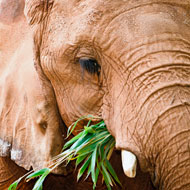
Poaching levels remain higher than growth rate
The number of African elephants killed each year by poachers exceeds the number of elephants born, according to a new report.
Figures released by the CITES MIKE Programme (Monitoring the Illegal Killing of Elephants) show a steady rise in the illegal killing of elephants since 2006.
Despite a slight decline since 2011, figures show that poaching rates overall remain higher than the normal growth rate of the elephant population. This means that the elephant population is likely to remain in decline.
In response to the figures, UN secretary Ban Ki-moon has called on UN agencies, CITES and partners to provide a coordinated response to wildlife crime. He also called on the organisations to spread the message that there should be zero tolerance for poaching.
"Time is running out to save some of the world’s most iconic species," he said. "Much more needs to be done by key actors on all continents and across sectors to combat poaching and address both the demand and supply of illegal wildlife products."
The most serious levels of poaching were recorded in Central and West Africa. Although poaching levels in South Africa remain below the threshold, a rise was noted for the first time in Kruger National Park.
Significant increases in poaching levels were also observed in Ruaha-Rungwa, United Republic of Tanzania and Chewore, Zimbabwe.
But it is not all bad news. Researchers saw a marked improvement in East Africa where, for the fourth consecutive year, natural births exceeded levels of illegal poaching.
"African elephant populations continue to face an immediate threat to their survival from unacceptably high-levels of poaching for their ivory, especially in Central and West Africa where high levels of poaching are still evident,” said John E. Scanlon, CITES secretary-general.
“There are some encouraging signs, including in certain parts of Eastern Africa, such as Tsavo in Kenya, where the overall poaching trends have declined, showing us all what is possible through a sustained and collective effort with strong political support.”



 The Veterinary Medicines Directorate (VMD) is inviting applications from veterinary students to attend a one-week extramural studies (EMS) placement in July 2026.
The Veterinary Medicines Directorate (VMD) is inviting applications from veterinary students to attend a one-week extramural studies (EMS) placement in July 2026.